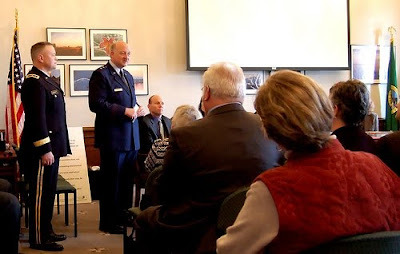“Hey, not so fast there, Governor.”
That’s the message southwestern Washington lawmakers are broadcasting about a plan to change who has the ultimate say-so at the Schools for the Blind and the Deaf in Vancouver.
State Rep.
Jim Moeller from Vancouver testified in a Senate committee hearing yesterday morning against the proposal in
Senate Bill 6491. He said later that the ideas in the bill have received “neither the appropriate level of fiscal scrutiny nor the appropriate level of public involvement.”
Moeller has arranged a public forum to discuss the legislation this Saturday, Jan. 23, at 10 a.m. The forum will be held in hearing room A on the first floor of the John L. O’Brien Building on the Capitol Campus in Olympia. Citizens can call or e-mail Moeller for driving directions. His Olympia phone number is 360-786-7872, his local Clark County phone number is 693-0804, and his e-mail address is moeller.jim@leg.wa.gov.
State Rep.
Jim Jacks, another Vancouver and 49th Legislative District Democrat, as well as fellow Vancouver Democratic state Reps.
Deb Wallace and
Tim Probst, who both represent the 17th Legislative District, share Moeller’s concerns about the proposal. The legislation would transfer governance of the Washington State School for the Blind and the Washington State Center for Childhood Deafness and Hearing Loss to the state Office of Superintendent of Public Instruction.
The legislation was requested by the governor. It directs that the state Superintendent of Public Instruction would make all appointments that are now made by the governor for the two facilities. Currently, the State School for the Blind is under the direction of the school’s superintendent, who works with a board of trustees. The governor appoints the school’s superintendent and the trustees. The governor also appoints the director of the Washington State Center for Childhood Deafness and Hearing Loss, as well as the center’s board of trustees.
Moeller points out that “I simply haven’t heard any concrete reasoning, either financial or otherwise, for making such a dramatic change in the way these two long-standing, very successful institutions are governed. There is no specific information about how such a reorganization would save money or improve services provided to these unique populations. It seems to me that proponents of this idea haven’t done enough to involve the most obvious stakeholders. Students, parents and advocates for children who attend these facilities must certainly be involved in the process.
“I understand that our state is facing a huge budget and revenue crisis,” Moeller added. “I know that we have to make some very big changes in the way we do things. But let’s not make changes just for the sake of making changes – especially not if the proposed changes are not even going to save money, anyway, and certainly not if the proposed changes are going to foul up a perfectly sound system of governance at these two schools.”
All interested parties are certainly invited and encouraged to attend the forum. Staff from the governor’s office will be there, and interpreters and Braille copies of the legislation will be provided.







